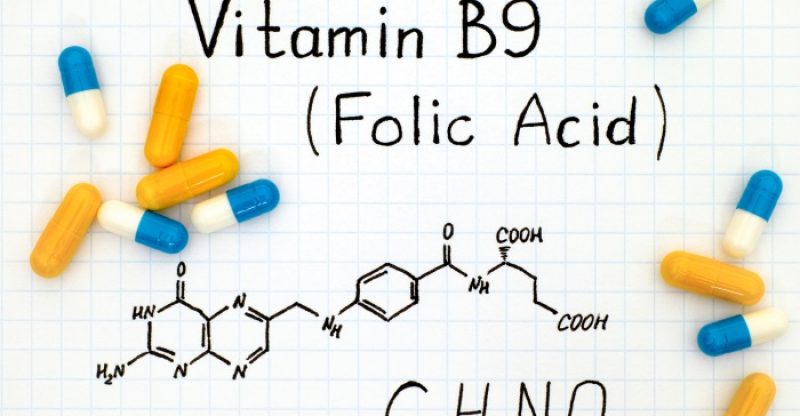17 Science-Backed Benefits of Vitamin B9 (Folic Acid)
Folic acid is one of the vitamins you need to ensure your body’s optimal functioning.
The many folic acid benefits, including cell division and facilitation of growth, make it an important part of the human body.
But most people know less about this important vitamin and, as such, end up either not taking it, taking low amounts, or taking a higher-than-needed dose.
The vitamin enhances your body’s metabolism by breaking down carbohydrates and other nutrients.
These are just some of the main vitamin B9 benefits.
Read on to know more.
What is Folic Acid?
Vitamin B9 used interchangeably with Folic acid, can be sourced from food in the form of folate, or can be formulated synthetically in the form of folic acid.
Vitamin B9 is one of the water-soluble vitamins and thus is not stored in the body (1).
Instead, it is taken in the form of folic acid.
Its name, folate, is Latin for ‘leaf,’ as green leafy vegetables are the richest sources of this vitamin.
Folate can be sourced from green leafy vegetables, legumes, and citrus fruits, among others (2).
Folates are available in many forms.
Naturally, in food, folates are metabolically active, appearing in the form of tetrahydrofolate derivatives such as 5-methytetrafolate (3).
On the other hand, folic acid, the supplement form of Vitamin B9, remains metabolically inactive until it is converted into folates.
The conversion of folic acid to folates occurs in your liver.
First, enzyme dihydrofolate reductase converts folic acid to tetrahydrofolate, THF.
The main circulating form of folate in the body is 5-methyltetrahydrofolate.
This form has a host of functions and benefits in the body, including amino acid and nucleic acid biosynthesis, conversion of amino acids, replication of DNA and RNA, and also acts as a cofactor in a number of biological processes (4).
Signs of Vitamin B9 Deficiency
It is common to have low folic acid levels in the body.
It is not stored, and as it is an essential vitamin, it is not synthesized.
When you do not keep supplementing it, therefore, your levels go down.
Inflammatory Bowel Disease, alcoholism, and celiac disease are some of the contributing factors to folic acid deficiency.
Again, some medications might lower the level of vitamin B9 in your body.
When you lack this vitamin, you might experience:
- Tongue inflammation
- Poor growth
- Gingivitis
- Shortness of breath
- Loss of appetite
- Irritability
- Diarrhea
- Forgetfulness
- Decreased mental activity
Pregnant women need folates for their bodies and for their babies.
With sufficient supply of folic acid, neural tube defects are prevented.
Such defects include cleft palate, brain damage, and spina bifida.
Neural tube defects occur as a result of abnormal development of the neural tube, which is the structure that gives rise to the spinal cord and the brain.
Nowadays, folic acid has been incorporated in grain foods, and the risks of neural tube defects have been significantly reduced.
Folic Acid and Birth Defects
When a pregnant woman does not get enough folic acid, they are likely to give birth to babies with birth defects.
A pregnant woman needs to take at least 600 mcg of vitamin B9 every day.
Women who are planning to get married need to take 400 mcg of folic acid each day.
Neural tube defects can develop immediately after conception, even before a woman realizes they have conceived.
Prenatal vitamins are loaded with the right amount of folic acid to get pregnant women the dose they need.
According to studies, women who take the right amount of folic acid supplements before pregnancy and a few weeks after conception reduce the risks of giving birth to children with neural tube defects by between 72 and 100 percent.
If you can get the folic acid from grains fortification, you do not need to take supplements.
Note that you only need the right amount, as surplus folic acid is not stored.
Folic acid deficiency has also been connected to miscarriages, but the evidence of this is still not clear.
Autism has also been linked to folic acid deficiency.
According to research, prenatal folic acid supplementation at the time of conception lowers the risk of autism.
When the brain develops as it is supposed to, language delays in children at the age of three years are reduced (6).
Low folate levels during pregnancy result in emotional stress of the newborn.
Folic Acid and Heart Disease
Folic acid deficiency is a contributing factor to heart disease.
Getting enough folic acid has been shown to lower the risks of heart disease significantly.
Again, people with high levels of the amino acid homocysteine have increased chances of developing coronary heart disease and stroke.
With sufficient levels of vitamin B9, levels of the amino acid homocysteine are significantly reduced.
Other conditions linked to folic acid deficiency include:
- Age-related hearing loss
- Age-related macular degeneration
- Depression
- Cancer
While the deficiency alone will not cause any of the above conditions, it will accelerate their development.
Folic Acid Benefits
Promotes Fetal Development
Folate plays a direct role in cell growth during the early stages of development in a baby.
When a pregnant woman does not get enough vitamin B9, the baby will develop abnormalities associated with underdevelopment of body parts, especially the brain.
Besides preventing neural tube defects, as stated above, folic acid supplementation during pregnancy minimizes the risk of cleft lips, congenital heart defects, and a host of other abnormalities that might occur immediately after conception (7, 8).
By supplementing with folic acid during pregnancy, a woman lengthens the mean gestation period and increases the weight of the baby to normal.
This reduces the risk of preterm labor and immature births in pregnant women.
To have a normal pregnancy and normal growth, therefore, a woman needs to supplement with the right amount of folic acid.
Reduces Risk of Cancer
Folate is important for the formation of nucleic acids.
It acts as a cofactor in the synthesis, repair, and stability of DNA molecules.
Again, when folates act as coenzymes, they regulate methylation of DNA.
This is important in controlling the expression of genes and cell differentiation.
When DNA methylation is not controlled, abnormalities might develop, which lead to mutations and cancer (9).
When your blood has low levels of folate, risks of developing certain kinds of cancer increase.
When you supplement with folic acid, you reduce risks of breast, pancreatic, lung, colon, and esophageal cancer.
This has been shown in a number of studies (10, 11).
While most of the studies are observational, repeated studies have shown the same results.
Nonetheless, taking a high dose of folic acid, above the daily recommended amount, will exacerbate the growth of cancerous cells.
This shows that the efficiency of folate in curbing the development of cancer is determined by the dosage.
You need to take the right amount of the supplement to avoid surplus problems.
The effectiveness of folic acid in suppressing the initial stages of cancer is dependent on the status of the cell development and differentiation at the time of folate exposure.
In animals, for instance, supplementing folic acid was found to prevent the development of cancer in normal cells and tissues, but it promoted tumor growth in regions where the tumor had already started developing.
This means that you can supplement with vitamin B9 to stop the formation of cancerous cells, but once the tumor has grown, Vitamin B9 supplementation will only accelerate their growth (12).
So you need to consider the dose you take and the timing of the supplement to prevent the growth of cancerous cells.
Prevents Coronary Heart Disease
According to studies, folic acid supplementation reduces the risks of coronary heart disease.
When homocysteine levels go up in your blood, the arteries harden, leading to heart diseases such as arteriosclerosis which later can contribute to the development of heart disease.
By supplementing with folic acid, the level of homocysteine in the blood is lowered and vascular function is improved in all CHD patients (13).
Homocysteine amino acid is regulated by B-complex vitamins including B6, B12, and B9.
If you are concerned about heart disease, concentrate on taking enough B-vitamins from natural food.
However, there are cases where your doctor might recommend taking a Vitamin B9 supplement to lower homocysteine levels.
If the thought of developing heart disease scares you, you need to talk to your doctor and ask whether a B9 supplement will be right for you.
Studies have also shown that men who consume enough folate in their diet had lower risks of heart attacks and strokes.
Fights Free Radicals
Just like vitamins C and E, folic acid acts as an antioxidant to fight free radicals in the body.
This has been shown in a number of clinical studies (14).
Free radicals are byproducts of oxygen metabolism and they are toxic to the body.
When left unattended, these radicals affect the central nervous system, leading to conditions such as dementia and Alzheimer’s disease; they also cause heart disease, inflammatory diseases, age-related changes in appearance such as hair loss, diabetes, and genetic degenerative diseases.
Generally, they poison the body. These free radicals must thus be removed.
Tests on rats that were exposed to arsenic acid showed that folic acid supplementation prevented mitochondrial and DNA damage.
The supplement did this by mitigating oxidative biomarkers and increasing antioxidant enzyme activity.
By doing this, folic acid keeps you safe from more than 20 diseases associated with free radicals in the body.
Enhances Brain Function
One of the folate’s benefits is to enhance normal brain development and performance, especially in children and seniors.
Low folate levels in the blood are linked to cognitive decline in seniors, epileptics, and those with psychiatric conditions (15).
Folic acid deficiency is also linked with cerebral cortex degeneration, which is the part of the brain that facilitates memory and learning.
This can be associated with increased homocysteine levels; folate is one of the vitamins that converts homocysteine to methionine.
Homocysteine is toxic to neurons and has been linked with neurodegenerative conditions such as stroke, epileptic seizures, and Alzheimer’s disease (16).
In animal studies, folic acid supplementation in animals with bacterial meningitis was shown to preserve memory and prevent the oxidative destruction of the frontal cortex (17).
Short-term supplementation of folic acid was shown to improve IQ scores, motor skills, and short-term memory in adults, especially those with cognitive impairment.
In children, supplementation of folic acid enhances the correct development of the brain.
Red Blood Cell Production
With enough folic acid supplementation, you enhance the production of red blood cells.
The vitamin is used in replication and division of red blood cells.
Its deficiency is associated with megaloblastic anemia, a condition where an individual has few but large red blood cells.
Vitamin B9 and other B-Complex vitamins are involved directly in erythropoiesis, the process through which red blood cells are formed.
The vitamin is required for proliferation during the cell differentiation process.
Folic acid deficiency impairs DNA synthesis and inhibits the syntheses of thymidylate and purine, which, in turn, impairs erythropoiesis, causing anemia.
While vitamin B9 is not the only nutrient required to synthesize red blood cells, it is a significant contributing factor.
Anemia is a common condition.
Most people supplement iron and forget the other nutrients needed to prevent it.
Most of the conditions caused by vitamin B9 deficiency are reversible with Vitamin B9 supplementation and treatment (18).
Fights Depression
Folate acts as a natural antidepressant.
Whenever you feel depressed, it means that your blood folate levels are low.
Folate plays an active role in the synthesis of dopamine and serotonin.
When these two neurotransmitters are not balanced, the result is the development of anxiety and depression disorders (19).
Folic acid stimulates serotonergic receptors in your brain to enhance the responsivity of the selective serotonin reuptake inhibitor, SSRI, in patients who are depressed.
By supplementing with folic acid, symptoms of depression have been shown to reduce in less than 60 days according to research.
It has also been shown that those with eating disorders, when supplemented with folic acid, showed significant improvements in their symptoms of depression.
For many years, folic acid has been shown to have a similar effect to antidepressants.
Hot flashes in post-menopausal women have been shown to occur thanks to disturbances in their thermoregulatory system and estrogen deficiency.
By supplementing with folic acid, estrogen levels have been shown to rise, which has reversed depression.
Prevents Age-Related Hearing and Vision Loss
Hearing problems and vision loss are a condition associated with many seniors.
Studies have shown that high intake of folate by the elderly reduces the risk of hearing and vision loss.
High intake of food, or supplementation, was associated with up to 60 percent reduced risks of developing hearing problems (20).
While there is no direct link between folate, vitamin B12, and other B-Complex vitamins, higher folate supplements, especially in men, reduce hearing loss significantly.
Folic acid, combined with a number of other nutrients such as vitamin B6 and B12, reduces the chances of developing age-related macular degeneration, AMD, a condition that causes blindness in seniors.
In women, folic acid and other B-complex vitamins reduce AMD by up to 40 percent.
By reducing the risks of developing AMD, heart disease in women is reduced.
As in all other instances, dosage and timing are key in the effectiveness of this supplement in hearing- and vision-loss prevention.
Keeps You Looking Young
As a person starts to age, the skin starts to wrinkle and sag.
These, among others, are age-related symptoms that can be reversed with intake of folic acid.
It has been shown that by supplementing with folic acid, you reduce the lifespan of roundworms.
This occurs by boosting oxidative stress resistance factors.
This effect, in turn, prevents the production of stress hormones and delays the aging process in humans (21).
Again, folate enhances metabolism and absorption of nutrients ingested.
Those who are eating healthily will lead a better and younger life.
By eating right and having an active metabolism, your skin looks toned and stays young.
Promotes Fertility
Folate is important in the synthesis of DNA and, as such, it enhances the development and survival of the fetus.
A study done on guinea pigs showed that a short-term deficiency of folic acid decreased reproductive health and performance significantly (22).
Polymorphism exhibited in folate pathway genes has been associated with fertility complications in females.
By supplementing folic acid, you increase fertilization rates, enhance oocyte quality, facilitate live births, and enhance production of mature oocyte yields.
This is normally seen in women who are undergoing treatment for infertility.
Folic acid also helps in male fertility problems.
By supplementing folic acid and zinc, male factor subfertility is reduced by up to 74 percent by increasing sperm count.
By having enough folate in the blood, men reduce their frequency of abnormal sperm production.
In most cases, men battling infertility problems produce abnormal sperm that interferes with conception.
The reproductive system develops from the fetal stage and with enough folic acid, the baby develops with a healthy system.
Clears Arsenic Poisoning
Exposure to arsenic increases the risk of heart disease, stroke, and cancer.
Exposure to arsenic that occurs over a brief period may be characterized by vomiting, watery diarrhea, and abdominal pain.
Long-term exposure can darken the skin and cause the diseases named above.
With folic acid supplementation, the arsenic acid levels in the blood are significantly reduced.
Once in the body, folates facilitate removal of arsenic acid through urine (23).
Vitamin B9 supplementation has to occur consistently to counteract the buildup of arsenic in the body.
There are different factors that might lead to the buildup of arsenic; you need to stay free of it.
Reduces Risks of Autism Spectrum Disorders
Folate plays a direct role in the development of the fetal brain.
Deficiencies in this vitamin are associated with decreased neurodevelopment, causing conditions such as autism and schizophrenia.
Deficiencies also result in language delays, social problems, and poor mental coordination in children.
With prenatal folic acid supplements, these conditions are reversed, leading to the full development of the baby’s brain (24).
Kids with autism can have folinic acid – a different form of folate – administered to improve their brain function.
When administered, folinic acid improves the symptoms of autism and enhances the decrease of oxidative biomarkers which might exacerbate the progression of autism.
The effectiveness of folic acid in curbing autism and other neurodevelopment disorders is greater when taken during pregnancy.
If taken then, vitamin B9 will help the brain to develop fully.
When used on a baby with autism, it only assuages the symptoms, but it cannot reverse the condition.
Promotes Immunity
Deficiency in most of the B-complex vitamins will lead to low immunity in humans and animals.
When you lack vitamin B9, which is vital in preventing a large number of diseases, your immunity will be low.
Clinical folate deficiency is first seen in megaloblastic anemia, a condition that mainly results from the impaired immune system and affects cell-mediated immunity.
The condition can be reversed by supplementing folic acid to patients.
A diet rich in folates or folic acid supplementation has been used to clear age-related T-cell proliferation and cytokine production changes in rats.
This shows that folic supplementation can be used to boost resistance to infections in seniors (25).
Reduces Damage to the Liver
Low blood folate is associated with oxidative stress, cancer, and liver damage.
Liver damage is normally caused by alcohol, smoking, and other factors.
Studies have shown there is a causal relationship between blood folate levels and liver damage.
By taking a folic acid supplement, the effects of alcohol on your liver are reduced by maintaining the level of glutathione and methionine.
These two hormones are responsible for liver detoxification (26).
Folates and Kidney Disease
Folates facilitate the functioning of the kidney, the liver, heart, and other body organs.
A study conducted on kidney disease patients showed that a combination of blood pressure medication and folic acid promoted kidney health better than the medication alone.
When used before kidney disease develops, folic acid is able to lower the chances of kidney disease development.
This study recommended the use of folic acid supplementation to delay the progression of chronic kidney diseases (27).
When used during the late stages of kidney disease, folic acid increases survival rates.
It reduces cardiovascular deficits and other kidney complications to offer patients relief from symptoms of the disease, and facilitate proper functioning of the kidney for a longer period.
While supplementation cannot reverse the damage to the kidney, it slows the progression of the disease, giving your kidney a longer life.
Strengthens the Bones
With the folic acid deficiency, there is an increased risk of bone fracture thanks to decreased bone mineral density.
Folic acid deficiency results in bone resorption also referred to as bone loss.
This can be associated with the action of nitric acid synthase, an enzyme responsible for preserving bone density by facilitating bone formation and ensuring there is no bone loss.
Folate acts as a cofactor in the activities of this enzyme.
However, folic acid only acts as a cofactor in the absence of tetrahydrobiopterin, the actual cofactor of this enzyme.
When taken, folic acid promotes the activities of nitric acid to maintain bone density.
The relationship between folic acid and bone strength, however, is not very strong, as it only comes in to help another cofactor.
Studies have shown that deficiency of this vitamin affects the development and strength of bones (28).
Folates and Weight Management
The main function of folates is to facilitate and promote metabolism.
When supplemented, vitamin B9 facilitates the absorption of nutrients and keeps your metabolism in tip-top shape.
For those who are trying to add weight, it increases your appetite, letting you eat more.
If you are trying to lose weight, folic acid enhances irritability and reduces fatigue and tiredness, which means you can exercise more.
Generally, folic acid keeps your body feeling re-energized for a long period.
Best Vitamin B9 Foods
Some foods are known to have more folates than others.
Leafy greens such as kale are rich sources of vitamin B9, but there are other sources too.
You can get folates from:
- Spinach
- Asparagus
- Dark leafy greens
- Beets
- Turnips
- Brussels sprouts
- Lima beans
- Beef Liver
- Mustard greens
- Soybeans
- Root vegetables
- Brewer’s yeast
- Wheat germ
- Bulgur wheat
- Whole grains
- Kidney beans
- White beans
- Mung beans
- Salmon
- Avocado
- Milk
- Orange juice
You can also find cereal products that are fortified.
Vitamin B9 Precautions
Risks
There are potential side effects when folic acid interacts with certain medications.
You should always take supplements under the supervision of a health care provider, especially if you have a chronic disease or you are taking medication.
When you take the recommended dose, side effects are minimal.
However, high doses might result in:
- Sleep problems
- Skin reactions
- Stomach upsets
- Confusion and reduced mental activity
- Loss of appetite
- Seizures and nausea
If you are taking more than 800 mcg folic acid per day, talk to your doctor.
When you take vitamin B9 supplements, it hides the deficiencies of other B-vitamins, such as B12, and this can cause permanent damage to your nervous system.
If you take one B-complex vitamin for a long time, you might cause an imbalance.
You should probably take a supplement including all B-vitamins.
If you have seizures or cancer, avoid taking folic acid supplements before talking to your doctor.
If you are still wondering what folic acid is, do not take it, and instead read this whole article first.
Dosage
In normal cases, you should get enough folates from your diet.
However, pregnant women will need to supplement.
Before you give folic acid supplements to children, talk to a healthcare provider.
Recommended Daily Allowances
Pediatric
- 0 – 6 months: 65 mcg
- 7 – 12 months: 80 mcg
- 1 – 3 years: 150 mcg
- 4 – 8 years: 200 mcg
- 9 – 13 years: 300 mcg
- Teens, 14 – 18 years: 400 mcg
Adults
- 19 years and older, men and women: 400 mcg
- Pregnant women: 600 mcg
- Breastfeeding women: 500 mcg
For heart disease, the amounts used might be relatively high – between 400 and 1200 mcg.
However, you need to take high levels of folic acid supplementation under the supervision of a doctor.
While the above is the recommended daily dosages, you need to consult your doctor for the right dosage.
Possible Interactions
If you are being treated with the following medications, you should first ask your doctor before using folic acid supplementation.
- Antibiotic Tetracycline
When used together with the antibiotic tetracycline, folic acid interferes with the absorption of this medication.
You should take folic acid or any of the B-vitamins at different times.
- Phenytoin
Phenytoin is an anti-seizure medication that lowers blood folate levels.
Folic acid supplementation will, however, interfere with the functioning of phenytoin.
- Pyrimethamine
This is a medication used to curb malaria and toxoplasmosis.
Folic acid supplements reduce the effectiveness of this medication.
- Chemotherapy medications
Folic acid raises the amount of capecitabine and 5-fluorouracil to harmful levels.
This means that you need to confirm with your oncologist before using folic acid supplements.
- Medications that lower folate in blood
There are some medications that lower absorption of folate.
This means you have to supplement folic acid when you are taking them.
They include:
- Antacids
- Proton pump inhibitors
- H2 blockers
- Bile acid sequestrants
- Non-steroidal anti-inflammatory drugs
- Triamterene and cycloserine, among others
When taken for a long period, these medications and others reduce the number of folates in the blood, and they necessitate the need for folic acid supplementation.
Conclusion
Vitamin B9 benefits are immense.
This vitamin is involved in a large number of body processes from metabolism to immune system, elimination of free radicals, promotion of cell growth, assisting in brain development, and a host of other functions.
You can get folate benefits from eating, but in most cases, folate is destroyed through cooking.
When preparing leafy greens, therefore, you need not overcook them.
You can also get vitamin B9 from supplements and fortified grains.
This is the best source of folic acid, as cooking might not destroy vitamin B9 in grains.
FDA Compliance
The information on this website has not been evaluated by the Food & Drug Administration or any other medical body. We do not aim to diagnose, treat, cure or prevent any illness or disease. Information is shared for educational purposes only. You must consult your doctor before acting on any content on this website, especially if you are pregnant, nursing, taking medication, or have a medical condition.
HOW WOULD YOU RATE THIS ARTICLE?






